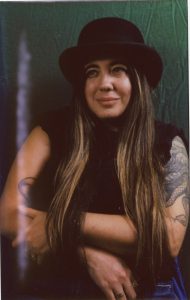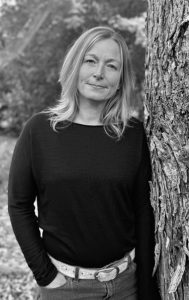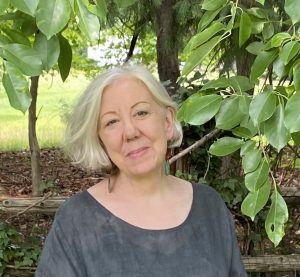
The Divine Lorraine stood at the intersection of Broad Street and Fairmount Avenue like a cathedral and a beacon, its gilded lettering lit day and night. Lottie Franklin arrived at its doors just past dusk, carrying a carpetbag with fraying corners and the address scrawled on a paper she kept folded like scripture in her brassiere.
A man in white held the door open. “Peace,” he said, and his voice was soft, as though greeting her into a dream.
She stepped into the lobby and blinked hard. The floor shone like sugar glass. Overhead, a chandelier hung heavy with light, and the air smelled of starch and lemons. There were no bellboys. No desk clerks. Just two women in pressed uniforms setting a flower arrangement beside a sign that read: All Are Welcome. No Smoking. No Drinking. No Cursing. No Segregation.
Lottie smoothed the lapel of her jacket, a borrowed houndstooth with the lining coming loose, and approached the table. “I’m here for work,” she said. “A Sister Essie told me to come.”
The woman arranging lilies, sharp-featured with cheekbones like mountain ridges, smiled but did not look up. “You’re already home, dear.” She passed Lottie a clipboard. “You’ll start in the kitchen, if that suits you. Father Divine believes labor is the highest form of love.”
Lottie signed the form with a hand that trembled slightly. “I been in kitchens my whole life. This one can’t be no worse.”
That made the other woman laugh—a rich, melodic sound that echoed like bells. “Honey, this is Heaven. We don’t do worse here.”
***
She settled in quickly. The Divine Lorraine was not a hotel in the way she’d imagined. No maids. No tips. No hierarchy. It was a commune of equals.
At 6 a.m., Lottie scrubbed potatoes in the basement kitchen, shoulder to shoulder with men who used to be porters and seamstresses who now called themselves Saints. At noon, they sang hymns over vegetarian stews thick with barley. At 8 p.m., they gathered in the meeting room to hear Father Divine speak through the phonograph or sometimes, by miracle, in person.
By the third day, she’d stopped waking with the heaviness in her chest. By the fifth, she’d stopped thinking about Elmer, her husband, back in South Carolina, and how he’d once thrown a chair at her for reading the Bible too loud.
The sixth day, she met Henry. He was tall but narrow, like a book left open on a table. His suit was pressed but slightly dated, and he had the bearing of someone used to being watched. Lottie found him in the kitchen doorway, his cap in his hands, looking over the lunch table as though searching for the answer to a question he didn’t know how to ask.
“You looking for someone?” she said.
He blinked. “No. Just curious.”
“About what?”
“This whole… operation.” He gestured to the rows of tables, the steaming plates, the silence and order of it all. “I got back from the war last week. Was told this place feeds anyone. Black or white. No money down.”
“That’s true.”
“Then what’s the catch?”
She looked him over. His hands were clean but calloused, his knuckles like broken pebbles. He had the thin layer of weariness she recognized in men who had been hungry, but not starved. Lost, but not entirely beyond return.
“There ain’t no catch,” she said. “Just don’t bring any liquor or hate through that door, and you’ll be fine.”
He nodded slowly, as though memorizing each word. Then he said, “Name’s Henry.”
“Lottie.”
He didn’t smile, but his shoulders dropped an inch. “Well, Lottie, if it’s all right, I’ll stay for a while.”
***
In the weeks that followed, Henry became a regular presence. He didn’t pray aloud. He didn’t sing. He wouldn’t wear the white robes others sometimes adopted on holy days. But he was always first to stack chairs after supper, and he took to washing the front steps each morning with quiet diligence.
“I’m not sure I believe in Father Divine,” he said one night, sitting with Lottie on the rooftop where they watched the city glow under a haze of streetlamps.
“You don’t have to,” she replied. “Just don’t speak against him. This place holds fragile things.”
He looked at her then, really looked, and said, “You fragile?”
“No.” She laughed. “I was broken. That’s different.”
He nodded like a man who understood.
***
There was a woman named Sister Geneva who led the prayers at dawn. Her voice climbed octaves like stairs. She’d lost two sons to the Spanish flu and her husband to the bottle, but here she stood each morning, palms outstretched, preaching love as if it were oxygen.
Geneva took a liking to Henry. “You’ve got a worker’s heart,” she told him. “Father Divine says labor is how the soul breathes.”
But Henry, while respectful, didn’t join the movement. He never referred to Father Divine as “God,” the way the others did.
“I think he’s a good man,” Henry told Lottie. “But I’ve seen what happens when folks give too much of themselves to one voice.”
“Maybe,” she said. “But when the voice saves you from drowning, you listen.”
He didn’t argue. Just stared out the window and tapped his fingers against his knee. “I got used to not believing in much,” he said. “But I like it here. Feels like some place a man can rest.”
***
It was the hour before the sun hit the horizon, that gray, sleepy time when nothing feels quite real. The kitchen was still and heavy with the weight of the night’s work. A single bulb hung low above the counter where Lottie stood, the smell of onions and garlic fresh in the air as she sliced vegetables for the day’s meals.
She had just finished cutting a potato when she felt it—the soft touch of a hand on her wrist. She froze.
“Couldn’t sleep,” Henry’s voice was low, ragged, as though the act of speaking took effort.
Lottie didn’t pull away. “You’re here early.”
“I know. Couldn’t stop thinking.”
She nodded, not wanting to press. But she did anyway. “About what?”
Henry was standing behind her now, close enough that she could feel the heat of his body through the fabric of her dress. She felt it like a fire at her back, a warmth that didn’t burn, but enveloped.
“About leaving,” he said, voice steady but with a note of hesitation she hadn’t heard before. “And about staying.”
Lottie set the knife down, suddenly self-conscious. “It’s not a hard choice, is it?”
“I’m not sure anymore.” He sounded almost sad. “I’ve been living a lie my whole life, Lottie. First, I was a soldier—fighting for something I wasn’t sure I believed in. Now I’m here, in this place, and it feels like… peace, yes. But I don’t know if I’m the man who deserves it.”
She turned to face him, surprised at the vulnerability she saw in his face—so different from the hard mask he’d worn when they’d first met. His eyes, wide and unsure, looked at her as if searching for an answer.
“You deserve it,” Lottie said softly. “This place doesn’t ask you to be anything you’re not. Not here, Henry. You’re allowed to rest. You don’t have to carry that weight anymore.”
He reached out, slowly, almost as if afraid of rejection. His hand cupped her cheek, and she leaned into it, feeling the roughness of his palm against her skin. “You know,” he said quietly, “I thought I was just passing through. But I can’t seem to leave. You’re here, too. I think… I think I want to stay for you.”
The words hung in the air between them, a quiet confession, one Lottie wasn’t sure how to answer. But she knew she didn’t want him to leave. Not yet. Not ever.
“I’m not going anywhere,” she said, her voice more certain than she felt.
His fingers slid from her cheek to the back of her neck, pressing gently, like a prayer.
And for that moment, the world outside—the one of uncertainty and violence—ceased to exist. There was only the warm glow of the kitchen light and the two of them, standing there, silently bound by the shared understanding that neither of them had ever truly found home. Not until now.
***
By December, snow clung to the Lorraine’s ledges like whipped icing. A few of the Saints had begun to murmur that Father Divine might come for Christmas, that he would bring Peace himself, and maybe a sermon that would shake the city walls.
Henry asked if he could stay in the Lorraine full-time. He moved into a third-floor room with pale yellow walls and no lock on the door.
He and Lottie began taking meals alone together in the corner of the kitchen. Not in secret—nothing was secret here—but in soft companionship.
“I used to think I needed a man to be worth something,” she said.
“And now?”
“Now I think I need a purpose.”
Henry smiled. “Maybe you found both.”
***
It was snowing again. Soft flakes drifted down, swirling through the cold night air as Lottie stood at the edge of the rooftop, watching the city below. Philadelphia was quieter in winter, as though the world itself was huddled for warmth, waiting for spring.
Henry joined her, his coat unbuttoned against the chill. He didn’t seem to mind the cold, but Lottie could feel the sharpness of it biting through her thin sweater.
“Cold night,” he said, and she looked at him, meeting his eyes in the dim light.
“I don’t mind it.” Her voice was steady, even though inside she felt the weight of the past few days bearing down on her.
Henry leaned on the railing beside her, his profile sharp against the backdrop of the falling snow. He was quiet for a long moment, the kind of silence that pressed against you like a door trying to close. Then he spoke again, his voice barely a whisper.
“Do you ever think about leaving?”
Lottie’s chest tightened. She didn’t have to ask him what he meant. She knew he wasn’t asking about the Divine Lorraine. He wasn’t asking about this city. He was asking about her. About them.
“No,” she answered simply. “I think about staying.”
He turned his head to look at her, his gaze searching, as if trying to piece together a puzzle that had no clear answer. “Even when it’s hard? Even when nothing feels sure?”
She took a breath, her fingers tightening on the cold metal of the railing. “Yes. Even then.”
Henry’s expression softened, though a shadow of something darker lingered in his eyes. “I don’t know how to feel sure. I’ve been told my whole life that nothing good comes easy. But here, it’s different. With you.” The words hung there, vulnerable, raw. She wasn’t sure what they meant, but she understood them and understood him.
“I’ve been running my whole life,” he continued, his voice thick with emotion. “From war. From men who told me how to be. From myself. But here, I don’t have to run anymore. I don’t have to be a soldier. I don’t have to pretend.”
Lottie reached out without thinking, her hand gently resting on his arm. “You don’t have to pretend with me, Henry. You never did.”
He was still for a moment, his eyes closing, as though he were allowing himself to feel her words fully. When he opened them again, there was something softer in his gaze—a glimmer of peace she hadn’t seen before.
“I think I’m starting to believe that,” he said quietly. “Starting to believe in this place. And in you.”
Her heart didn’t flutter in her chest, not in the way Henry wanted, not in the way it had with women in the past. “Then stay,” she said, calmly.
He exhaled slowly, as if the weight of his decision had lifted just slightly. “I will. I’m staying.”
And together, they stood there in the falling snow, each silently acknowledging the promise between them.
***
The thing unraveled when a reporter from the Philadelphia Inquirer snuck into the Lorraine and took photographs—blurry shots of the integrated dining room, of white and Black men praying side by side. The next morning, the street outside the hotel filled with policemen and protestors.
Lottie heard one shout, “You’re a fraud, Father Divine! You’re nothing but a preacher with a cult and a cash box!”
The hotel locked its doors for the first time in three years. No guests. No new arrivals. Henry paced like a caged dog. “I fought for this country,” he snapped. “Took shrapnel in the leg for it. And now I’m a ‘cult member’ because I eat in a clean room with clean people?”
“Don’t take it in your chest,” Lottie said. “They hate what they don’t understand. They always have.”
But Henry’s calm was gone. Three days later, he left. Said he needed “air.” Said he’d be back by dinner.
Lottie waited. He didn’t return that night, or the next. On the third day, Sister Geneva came to Lottie with a folded newspaper.
They found his body near the Schuylkill River. Beaten. Wallet gone. Coat torn. The article called him “a transient.” No mention of his service, his work, his gentleness. Lottie closed the paper. She folded it once, twice, and a third time.
***
At the New Year’s meeting, Father Divine spoke in person. His voice was clear and musical, ringing through the ballroom with divine calm.
“We are not measured by what the world calls us,” he said. “We are measured by how we love.”
Lottie sat in the front row, her back straight, her hands in her lap. She wept, but she did not cry out.
Later that night, she walked the hallways, brushing her fingers against the brass handrails, the smooth-painted walls, the framed photos of Father Divine handing out loaves of bread.
In the kitchen, she peeled onions until her hands stung. She scrubbed the stove until her knees ached. She looked up once, as if expecting Henry to lean in through the doorway, cap in hand, asking about lunch. He didn’t. But she remained. Because someone had to. Because someone always must. And when she prayed now, she prayed for him. For Elmer, too. For every man who didn’t know how to come in from the dark.
She prayed, and she peeled, and she sang. Heaven, she thought, had never looked like gold. It looked like this: a clean floor, a hot meal, a room without locks. Peace, in pieces. But still peace.
Justin Taroli is a writer based in New York City. Originally from Pennsylvania, his work often explores small-town life, queerness, and the uncanny edges of the everyday. He is at work on a collection of short stories.





